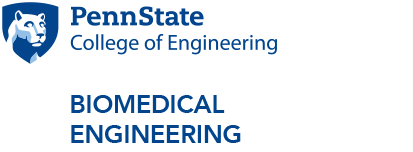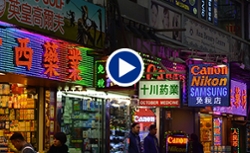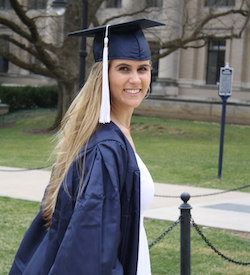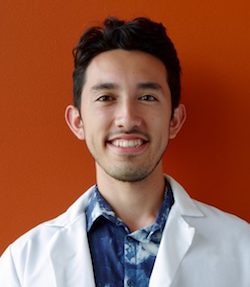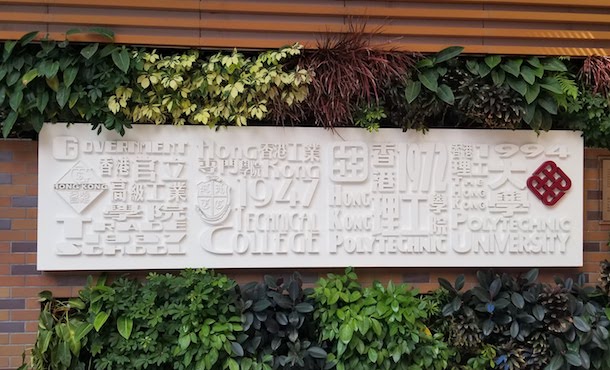
Unique sign outside Hong Kong Polytechnic University offers a summary of the university's development as an institution.
Learning on the other side of the world, part 1
Penn State students visit Hong Kong as part of global capstone project
4/12/2019
Note: This is the first in a two-part series about the Department of Biomedical Engineering’s global capstone project with the Hong Kong Polytechnic University. Part one will cover the Penn State’s student experience in Hong Kong, while part two is about the Hong Kong Polytechnic University students’ experience visiting Penn State.
When most Penn State students last year were preparing to return home for Thanksgiving break, Kevin Godzik and Julia Minakowski, seniors majoring in biomedical engineering, were preparing to travel to the other side of the world.
During November 17-22, 2018, Godzik and Minakowski visited Hong Kong Polytechnic University (PolyU) as part of the Department of Biomedical Engineering’s global capstone project. The program is in partnership with PolyU and annually features two Penn State students and Dan Hayes, associate professor of biomedical engineering, working closely on a research project with two PolyU students and Xin Zhao, assistant professor of biomedical engineering with PolyU.
Along with Minakowski and Godzik, this year’s PolyU students include Chi Hin “Gordon” Hung and Tanyaporn “Beam” Panyang. The program was coordinated at Penn State by Siu Ling “Pansy” Leung, former biomedical engineering undergraduate program coordinator and current assistant teaching professor with the Department of Mechanical Engineering.
Hung and Panyang visited Penn State in January, doing an American version of the trip that Minakowski and Godzik took in November.
To offer Penn State students the Hong Kong global capstone opportunity was a challenge, Leung said, because at Penn State, a capstone project is a single semester, and at PolyU, a capstone project takes up the entire academic year. So, to work with PolyU, Penn State structured a full-year global capstone project where the two Penn State students take BME 496 Independent Studies with Hayes in the fall and complete BME 450 Biomedical Senior Design in the spring.
“I would say this is a successful global capstone model,” Leung said. “A Penn State capstone project is one semester, most capstones in Europe and Asia are a whole year, so the question becomes 'how can we work with those universities?' But with this new format, we can expand our cooperation with European and Asian universities. Based on Julia and Kevin’s experience alone, I’d say it works very well.”
Global undergraduate research
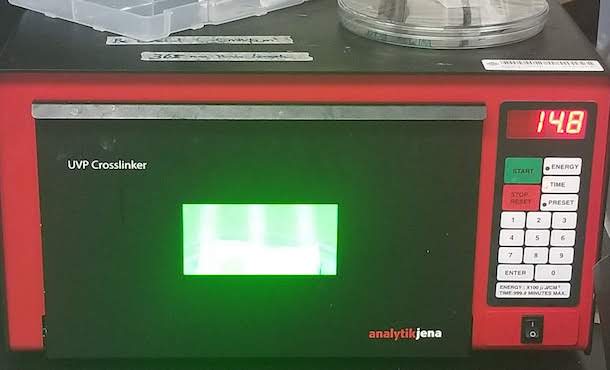
The Hong Kong global capstone project is titled “Development of a Novel Hairy Hydroxyapatite Strengthened Hydrogel Membrane as Artificial Periosteum.” The work focuses on creation of materials to promote angiogenesis, the development of new blood vessels, and osteogenesis, the formation of bone.
“In the case of a bone fracture, in an ideal scenario you'd be able to wrap the material around an injury and help the bone regenerate,” Godzik said.
To create such a material, Minakowski said there is a lot of trial and error.
“It involves figuring out the ratios of different chemicals or materials,” she said. “Basically, if we use a little bit more of this when we mix it with another substance, will that be better for angiogenesis or osteogenesis? Kind of like figuring out a better cooking recipe.”
Minakowski and Godzik spent their days during the visit doing research in the PolyU labs, touring their facilities and meeting with faculty. They learned a new technique, electrospinning, which is jetting a substance through a very small needle using applied voltage. This enabled them to create sheets of very fine fibers that are overlaid on top of each other, creating a network of crosslink nanofibers that is both mechanically stable and able to induce differentiation of stem cells into other cells. After drying, they brought the materials back to Penn State for more research.
Godzik said that their research is going to be limited to in vitro testing. The eventual goal, if they find positive results in the in vitro testing of the materials, is for Zinn and her lab to do in vivo testing.
“As far as using this material in a clinical setting, any material developed in a research setting will take years and years to be applied to humans," Godzik said. “But hopefully we can generate some results that will help future researchers make more materials like this.”
A different way to learn
Regarding the cultural aspect of their trip, Godzik and Minakowski discovered differences between the university experiences in Hong Kong and Penn State. For example, PolyU has a more concentrated 13-week semester, as opposed to Penn State’s 15-week semester.
“Their semesters are intense,” Minakowski said. “Their libraries are always full, even fuller than ours. It’s as crowded as Penn State’s libraries during finals week, except it’s all the time.”
PolyU biomedical engineering students also do more application-based work, including taking classes such as welding. Then during the last few weeks of the PolyU semester, the students focus on presentations and projects. At Penn State many courses have groups of students work on different projects, while at PolyU student groups in a course are all assigned the same project. Godzik sat in on one class where students were doing project presentations on how to diagnose and treat a patient with an arm injury. The students critiqued the other students’ presentations.
“Since they all had background in the same project, they were better able to point out both flaws and good things,” he said.
Seeing the sights, and an adventure

While their days were filled with research and classroom experiences, Minakowski and Godzik had plenty of time to sample Hong Kong culture during down time. Their hosts showed them around Hong Kong in the pleasant, warm weather.
“They take great care of their city and I thought it was very clean and very beautiful,” Minakowski said. “The residents of Hong Kong also take lots of pride in the way they present themselves. Everyone looks stylish, and it's so nice.”
They had a traditional Cantonese lunch with PolyU faculty, including a dish featuring cow stomach. Another memorable food experience was trying a classic Hong Kong street food, which were egg waffles that are served with a gooey topping that included condensed milk, sugar, peanut butter, margarine and coconut.
They also went sight-seeing in and around Hong Kong. One of their side trips to hike the famous Dragon’s Back Trail on the outskirts of the city led to a typical tourist adventure—getting lost in a strange land.
“After the hike we got on a bus and we were going through the countryside, eventually coming to a small town that was the end of the bus line,” Godzik said. “We had to figure out how to get a car back to the hotel, but eventually figured out how to get an Uber car to take us back.”
“Add oil”
Not only did they learn new research methods, experience education in Hong Kong, and immerse themselves in another culture, Godzik and Minakowski said they learned a new expression that stuck with them: “add oil.”
“When we were sitting down to dim sum with the PolyU professors and Beam and Gordon, we learned this saying they use to wish you success and offer encouragement,” Minakowski said. “It translates in English to ‘add oil.’ They didn't realize we didn't have that expression, but it’s become Kevin and I’s little thing since we got back. We tell each other ‘add oil.’ I brought back a bag and a shirt that says it in Cantonese.
“It's so nice to bring a part of their culture back here, and it’s something I’ll remember when I need a little encouragement to meet a challenge. I’ll tell myself to ‘add oil.’”

